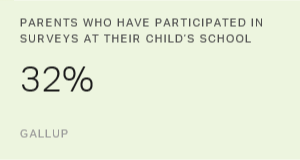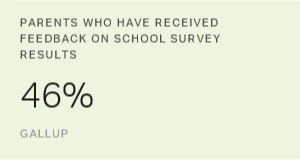Schools Missing Big Opportunities to Engage Parents

STORY HIGHLIGHTS
- Schools need to conduct parent surveys or research
- Schools need to proactively communicate study results to parents
- Parents who don't participate in studies twice as likely to be actively disengaged
Parents play an essential role in school success and student achievement.
Gallup researchers, academic scholars and business practitioners have demonstrated this. A recent Gallup study shows that if parents are fully engaged with their child's school, 94% are very likely to recommend the school to friends or family members.
There's an increasing demand for schools to understand parents' needs and expectations and to build trust and gain the support of parents.
Engaged parents are not only great advocates for their child's school -- they also have ideas that will aid school improvement efforts. Parent engagement is relatively simple to measure, and schools can manage it with reasonable effort. However, Gallup's latest research shows that only one-third (32%) of parents have ever participated in a parent survey or research study conducted by their child's school or on behalf of their child's school.
Parent studies can inform school leaders of both the explicit and implicit expectations of parents. In addition, regular and timely measurement can establish an efficient feedback loop, so schools can quickly identify their strengths and opportunities as well as the effectiveness of their previous efforts.
Finally, parent studies provide an effective channel and framework for school leaders and parents to communicate and build trust with each other. This partnership between parents and schools can increase parents' ownership and responsibility to be more involved with and enthusiastic about the school -- Gallup's definition of engagement.
Communication Needs to Improve
Less than half of parents who have participated in a parent survey (46%) have received communication informing them of the results. This means that more than half of parents never receive any feedback of the study results, despite their participation.

While conducting parent surveys can be helpful and informative for school leaders, schools are missing an opportunity to build engagement if administrators keep the results to themselves.
Among parents who have received communication of the results, 71% think the parent survey or research will bring meaningful change to their child's school. Fifty-three percent of parents who have participated in the study but never received communication of the results say the same.
When parents believe the studies will bring meaningful change to a school, they are 2.6 times more likely to be fully engaged parents. Communication of results seems to instill faith and foster goodwill with parents, developing more loyal advocates for the school.
Schools need to communicate their results and change management plans to parents who have participated in studies, but the dissemination of results should not stop there. Gallup research shows that silent parents -- those who do not take advantage of opportunities to participate in the research -- are twice as likely to be actively disengaged with their child's school. Actively disengaged parents are more likely to consider sending their child to another school when they have that option and may be more likely to voice their negativity to others, undermining the reputation of the school.
Gallup research suggests that great schools put in the effort to measure parent engagement on an ongoing basis and make intelligent, data-backed decisions based on the insights from parent surveys. Further, measuring engagement creates opportunities for school leaders and parents to review the study findings and collaborate on a path to school improvement.
Survey Methods
Results are based on a Gallup Panel outbound phone study completed by 1,002 national adults, aged 18 and older, conducted from June 27-July 9, 2016. The sample for this study was weighted to be demographically representative of the U.S. adult population using the latest Population Survey figures. The Gallup Panel is a probability-based longitudinal panel of U.S. adults whom Gallup selects using random-digit-dial phone interviews that cover landlines and cellphones. Gallup also uses address-based sampling methods to recruit Panel members. The Gallup Panel is not an opt-in panel, and Gallup Panel members do not receive incentives for participating. For results based on this sample, the margin of sampling error is ±3 percentage points at the 95% confidence level. Margins of error are higher for subsamples. In addition to sampling error, question wording and practical difficulties in conducting surveys can introduce error or bias into the findings of public opinion polls.
Schools Missing Big Opportunities to Engage Parents | Gallup:

